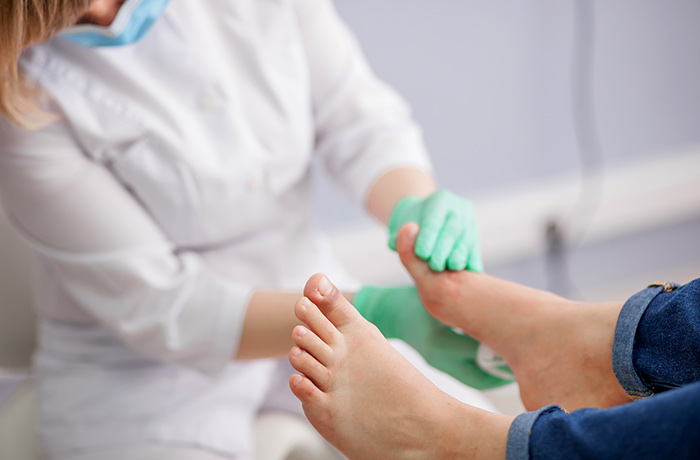
When we have a cut, most of us assume that it will simply heal with proper care. Yet healing is actually a complex process. Sometimes it takes more than just time to heal a wound.
Wounds that linger for weeks or months and won’t properly heal without medical intervention are called chronic wounds. A wound is considered chronic if it hasn’t significantly healed by three months or decreased at least 50% in size in four weeks. “Chronic wounds can have very serious complications if left untreated,” said Erin Wisniewski, nurse practitioner and certified wound specialist with Holland Hospital’s Wound & Ostomy Care Program. “The longer a wound is open, the higher the risk for infection and the greater likelihood it will impact a person’s quality of life.”
Individuals living with a chronic wound can experience chronic pain, loss of function and mobility, increased stress, social isolation, depression and anxiety, prolonged hospitalization, and even a higher risk of death. While a fresh wound is normally red, irritated and possibly swollen, a chronic wound can have:
- Numbness around the wound area
- A change in color
- A foul odor
- Discharge
- Noticeable swelling
- No scabs, new tissue or signs of healing within a 30-day period
Chronic wounds are usually the result of an underlying condition or conditions that need to be treated in order to promote healing. These health problems or conditions include:
- Infection: Infections in a wound can stop the healing process. Instead of healing the wound, the body fights the infection.
- Poor circulation: During healing, your body’s red blood cells carry new cells to the wound to begin rebuilding tissue. If you have poor circulation, it can slow down this process and stall healing. Diabetes, obesity and vascular conditions can lead to poor blood circulation.
- Diabetes: For people who have diabetes, all wounds are a serious health concern that require careful monitoring. Elevated blood sugar can slow down blood circulation and negatively impact the immune system, putting someone with diabetes at higher risk for infection. Due to diabetic neuropathy (a type of nerve damage that most often affects the legs and feet), skin cuts and blisters can also go unnoticed until they become more complicated to heal.
- Swelling: Persistent or excessive swelling is the result of fluid accumulating in the skin. Swelling can impair the body’s ability to heal a wound by restricting oxygen to the skin.
- Repetitive trauma: Paraplegics, spinal cord injury patients or individuals on bed rest are at risk for what’s known as repetitive trauma. When someone is unable to change positions frequently, it can lengthen or stop a wound from healing.
- Nutritional deficiency: Poor nutrition is an often overlooked contributor to insufficient wound healing. To build new tissue, your body needs as much as three times the normal daily requirement of protein. Proper hydration is also key during the wound healing process.
Specialized Treatment for Wounds Close to Home
Holland Hospital’s Wound & Ostomy Care Program offers outpatient care, support and expert advice for acute and chronic wounds, as well as new or established ostomies. Our dedicated team includes certified wound, ostomy and continence nurses (CWOCNs), general surgeons, podiatrists and advanced practice providers who collaborate with vascular specialists, lymphedema therapists, infectious disease specialists and others to provide comprehensive treatment for all non-healing wounds, such as pressure injuries, diabetic foot ulcers, burns, and post-surgical and vascular wounds.
“If someone has concerns about a wound, the best thing they can do is visit their primary care doctor,” Wisniewski said. “From there they can be referred to our Wound & Ostomy Care Program, where we have advanced dressings, tools and therapies to help ensure healing.”
On your first visit, our team of wound care providers will evaluate your wound and work closely with you to create a personalized plan of care. For more information on our program, call Holland Hospital Wound & Ostomy Care at (616) 494-4251.
